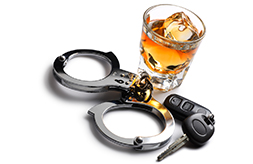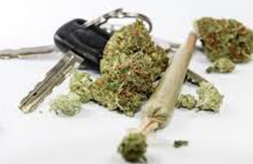
CRIMINAL DEFENSE ATTORNEY DEFENDS CHARGES FOR DRIVING WHILE INTOXICATED (DWI)—N.J.S.A. 39:4-50(a) through (i)
What conduct constitutes DWI, e.g., a violation of N.J.S.A. 39:4-50?
Simply put, the statute prohibits three (3) specific types of conduct, e.g., (1) operating a motor vehicle while impaired due to ingestion of alcoholic beverages, (2) operating a motor vehicle while impaired due to ingestion of prescription drugs (oxycodone, zanax, valium, etc…) or controlled dangerous substances (marijuana, cocaine, heroine, etc…), and (3) allowing another to operate your motor vehicle while he or she is impaired due to ingestion of either alcohol or narcotics, prescribed or otherwise.
What is the gradation of the offense?
Interestingly, DWI is not a criminal offense in New Jersey (although it is a felony in New York, Pennsylvania and many other states). It is a violation of Title 39, e.g., the statutes governing traffic violations. If you are charged with DWI and subsequently convicted, however, the mandatory sentencing requirements are so significant that you will definitely feel as if you have been convicted of a criminal offense. (developed infra)
How can a police officer tell with certainty that I am driving while impaired by ingestion of alcohol or drugs?
The origin of the officer’s suspicion usually stems from an alleged commission of a traffic violation such as N.J.S.A. 39:4-88 (Failure to maintain lane), N.J. S.A. 39:4-97 (Careless driving), N.J.S.A. 39:4-98 (speeding), etc… or from a serious collision. He subsequently either signals you to pull over or pulls up to the disabled vehicle(s). As he approaches the vehicle he may make an observation which gives him probable cause to believe that you are under the influence of alcohol or narcotics, e.g., perhaps he smells the odor of alcohol emanating from the passenger cabin of your automobile, perhaps you fumble for your drivers license, registration and insurance identification card, perhaps your speech is slurred or eyes are bloodshot, perhaps he sees an open container (empty beer bottle) or drug paraphernalia in plain view inside the center console of the vehicle. At this point, the officer can legitimately contend that he has probable cause to believe you may have been operating your vehicle under the influence. He can then require you to exit the vehicle and to perform divided attention tests known as Standardized Field Sobriety Tests (SFST). These tests promulgated by the National Highway Transportation Safety Authority (NHTSA), are designed to indicate whether the likelyhood you are “impaired” by alcohol in excess of .08 “per se” is great enough that you should be required to undergo Alcotest breathe testing. There are three (3) tests endorsed by the N.H.T.S.A. as constituting reasonably good indicators of alcohol impairment, e.g., the horizontal gaze nystagmus test, the heel to toe touch walk and the single leg raise test. (developed infra) The officer is required to instruct you and to demonstrate to you how to perform these tests (roadside). You are then required to satisfactorily perform the tests when instructed. If you fail to perform the tests as instructed, you are charged with “clues” or deviations from the instructions. Deviations generally can be described as failure to maintain balance, keeping arms out to side to help balance, starting test before instructed to so, failure to walk straight line, etc…If the amount of “clues” reaches a tipping point, you’ve failed the SFSTs, you are presumed to be impaired and you are then carted off to the police station and required to submit to chemical breathe testing on the Alcotest machine under State v. Chun, 194 N.J. 54, 943 A.2d 114 (2008). Refusal to submit to the Alcotest constitutes an additional violation known as “Refusal” under N.J.S.A. 39:4-50.2. The Alcotest machine result is the legal determinant of whether your blood alcohol content (BAC) either is, or is not, .08 “per se” or greater, e.g., the legal limit of the so-called lower tier. If, on the other hand, you have been involved in a collision and are either severely injured or are not conscious when the officer arrives, the procedure is to call for an ambulance and obtain a blood sample drawn by hospital personnel. Specialized DWI blood drawing kits are available to hospital personnel and in the normal course a nurse will take the blood sample for the State. It is subsequently shipped to a State Police laboratory for analysis. There is a whole body of law surrounding correct and incorrect procedures regarding drawing of blood, storing the blood, measuring the BAC, and possible contamination of blood samples. If the officer believes you are impaired when operating the vehicle, but you exhibit no signs of alcohol ingestion, you will be taken to the police station for the taking of a urine sample and evaluation by a Drug Recognition Expert (DRE). A DRE is a police officer that has been certified as an expert in determining whether you were impaired by narcotics ingestion, whether prescription drugs or controlled dangerous substance (CDS) (contraband), at the time you were operating your automobile. State v. Tamburro, 68 N.J. 414, 421, 346 A.2d 401 (1975). State v. Johnson, 42 N.J. 146, 165, 199 A 2d. 809, 819 (1964).
O.K., So I have been charged with DWI (N.J.S.A. 39:4-40), reckless driving (N.J.S.A. 39:4-96) and failure to maintain lane (N.J.S.A. 39:4-88). What is my exposure?
On conviction for a fist offense for readings (BAC) of .099 or less, monetary fines of not less than $250.00 nor more than $400.00 plus possible (but not likely) jail of up to thirty (30) days, plus suspension of drivers license for three (3) months, plus intoxicated driver’s resource center (IDRC) for twelve (12) hours, plus other pecuniary penalties of Violent Crimes Compensation Board (VCCB) $50.00, Deider Penalty (DDEF) $100.00, Safe Neighborhoods (SNSF) $75.00. Caveat: You can be convicted just for failure of the SFSTs even if your readings are significantly below .08. On conviction for a first offense for readings of .10 or greater, or for a drug DWI, monetary fines of not less than $300.00 nor more than $500.00 plus possible (but not likely) jail of up to thirty (30) days, plus suspension of drivers license for a minimum of seven (7) months and a maximum of twelve (12) months, plus IDRC for twelve (12) hours, other pecuniary penalties of VCCB $50.00, DDEF $100.00, SNSF $75.00. If the readings are in excess of .15 the interlock device must be installed on the defendant’s vehicle for a minimum of one (1) year after the suspension period has run and the defendant’s drivers license has been restored. Operating a motor vehicle in violation of an interlock Order is a disorderly persons offense (e.g., criminal offense) (developed infra) Caveat: Enhancements apply under section (g) if you were operating your vehicle on any school property used for school purposes, driving through a school crossing designated as such by a municipality or driving through a school crossing knowing that juveniles are present. On a first offense monetary fines of not less than $500.00 nor more than $800.00, mandatory jail time of not more than sixty (60) days, plus loss of drivers license of not less than one (1) year nor more than two (2) years.
On conviction for a second offense, monetary fines of not less than $500.00 nor more than $1,000.00, plus possible jail (usually not imposed for readings under .20) of not less than two (2) days and not more than ninety (90) days, plus community service of thirty (30) days, suspension of drivers license for two (2) years, plus IDRC of 48 hours, plus other pecuniary penalties of VCCB $50.00, DDEF $100.00, SNSF $75.00. If the readings (BAC) are in excess of .15, interlock device must be installed on defendant’s vehicle for a period of not less than one (1) year after drivers license is restored. Enhancements apply under section (g) if you were operating your vehicle on any school property used for school purposes, driving through a school crossing as designated by a municipality or driving through a school crossing knowing juveniles are present. On a second offense the sentence is increased to the imposition of monetary fines of not less than $1,000.00 nor more than $2,000.00, plus jail time of not less than four (4) days nor more than one hundred and eighty (180) days, plus perform community service for a period of sixty (60) days, plus loss of drivers license for four (4) years.
On conviction for a third or subsequent offense, monetary fines of not less than $1,000.00, plus jail time of one hundred and eighty (180) days, 90 of which can be served in an IDRC approved in-house rehabilitation facility, plus drivers license suspension of ten (10) years, plus additional pecuniary penalties of VCCB $50.00, DDEF $100.00, SNSF $75.00, plus imposition of interlock device applies upon restoration of drivers license. Caveat: Enhancements apply under section (g) if you were operating your motor vehicle on any school property used for school purposes, driving through a school crossing as designated by a municipality or driving through a school crossing knowing juveniles are present. On a third offense, the sentence is increased to the imposition of monetary fines of $2,000.00, plus jail time of (and additional) one hundred and eighty (180) days in the county work house, plus drivers license suspension of twenty (20) years.
I just cannot lose my driving privilege. Does New Jersey have a “get to work license” like New York?
No. If a New Jersey court suspends your driving privileges you may not operate a motor vehicle in New Jersey until the suspension time frame lapses and you are restored with the Motor Vehicle Commission (MVC). There is no such thing in New Jersey as a “get to work license”. Caveat: The penalty for driving while suspended during the time within which your privileges are suspended for DWI for a first offense include a fine of $1,000.00, mandatory jail time of not less than ten (10) days nor more than ninety (90) days, plus an additional one (1) to two (2) year loss of drivers license. For a second offense, new statute makes it a fourth degree crime with minimum mandatory jail time of one hundred and eighty (180) days.
What are my chances of being able to secure a plea (downgrade) to a lesser included offense without loss of license or possible jail time?
Generally not good unless your readings were less than .08 or there is a glaring error in the Alcohol Influence Report rendering the “per se” Alcotest results inadmissible. The State is expressly prohibited by law from plea bargaining DWI charges down to a lesser included offense State v. Hessen, 145 N.J. 441, 678 A2d. 1082 (1996), R. 7:6-2(d), unless the State acknowledges cannot prove guilt beyond a reasonable doubt. Under those circumstances, the prosecutor may agree to a downgrade but he or she is also required to make the representation that he or she cannot prove the case on the record. This usually occurs when the police officers processing the case have made a procedural error that renders the prosecution of the “per se” charges impractible or inutile. When this situation occurs, the readings may be suppressed and it is then possible to get an upper tier first offense (7 to 12 month loss of drivers license) downgraded to a first offense lower tier (3 month loss).
I was drinking and driving. How is it possible to win a trial?
Generally speaking I successfully attack the reliability of the Alcotest readings to win a trial. This is true because the statute says that if the machine finds
your readings (BAC) to be .08 per se or greater you are automatically in violation of the statute. In State v. Chun, 195 N.J. 54 (2008), the New Jersey Supreme Court determined that the Alcotest machine is reliable provided that certain safeguards are met and certain procedures are properly performed by the officer operating the Alcotest machine. The machine measures blood/breathe alcohol ratios two ways simultaneously, e.g., by infrared means and by electro chemical means. The machine’s software also generates “foundational documents” designed to prove the accuracy of each function the machine performs on each Alcotest breathe test. One of those documents is the Alcohol Influence Report (AIR) which is a compilation of all the relevant data. Other important documentation includes digital data downloads of what is referred to in Chun as “historical alcotest data”, which is a history of all transactions performed by the machine over many six (6) month cycles. The State has the duty to provide defense counsel with this documentation prior to trial and to prove all safeguards were in good working order when your breathe test was performed. Sometimes I, or my expert witness with whom I work, find errors in the data which create reasonable doubt as to the reliability of your readings (BAC). Under those circumstances, the readings may be suppressed by way of Motion to suppress.
On a second or subsequent offense, the SFST results must also be successfully attacked. Some townships make squad car videos of the SFSTs and some do not. The police officer must be cross examined with regard to the administration of the tests and the grading of the test results.
If you’ve been charged with DWI, you need to know these are complex matters and are very hard to win. I can help you.
Please contact me for your free initial consultation and a no nonsense discussion about how I can help you, if retained, to avoid the consequences of conviction, especially if it’s a second or subsequent offense.
Stephen A. Gravatt, Esq.
(732)-337-7922
www.njdwicriminaldefenseattorney.com



